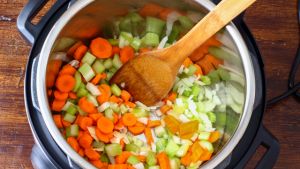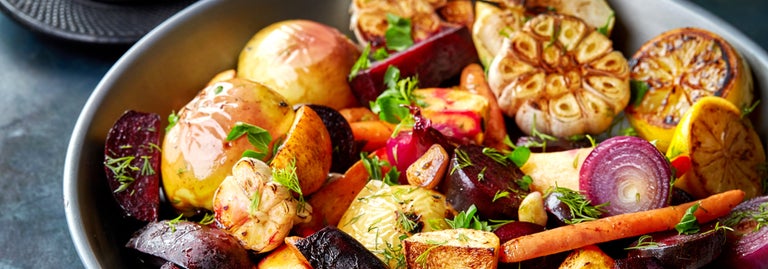It’s not uncommon for our energy bills to spike over the winter months. Household costs increase particularly due to our heating use and clothes dryers. Dryers are energy-hungry; an average dryer cycle costs about $1 per load. Heaters add to the power bill, too: a two-bar electric space heater running for five hours in the evening will cost almost $3, which is more than $20 a week in winter, according to Genesis.
We know we need to flick off lights and appliances we’re not using in the living room, be aware we’re not wasting power by leaving heating on in bedrooms unnecessarily, and avoid using the dryer when we don’t have a big enough load. But during winter, we spend plenty of time in the kitchen, too. What can we do there to save money?
Grocery-buying tips
1. Plan your meals
By planning your household’s meals each week, you’ll be able to buy only what you need. Write down a menu covering breakfast, lunch, and dinner for at least five days. Consider the foods your family likes, your preparation methods, and the time and energy you’ll require to make the meals. If you have kids, they can be involved, too; have them write down meal ideas and encourage them to help in the kitchen. Make sure to check your cupboards, freezer and fridge before you make any shopping lists, so you use up what you already have.
2. Buy in season
Modern supply chains mean we can get our hands on almost any kind of fruit or vegetable at the supermarket, whatever the season. However, we should always try to buy produce that is in season in NZ, and grown as locally as possible. Imported fresh produce is generally far more expensive than fruit and vegetables grown in-season in NZ. For example, during winter, a small punnet of imported raspberries might cost you from $8-$10. Shop smart, and think about where your produce is coming from. For the same price as the imported winter raspberries, you’ll get kilos of NZ apples, pears or mandarins and, of course, you’ll have a lighter impact on the planet. Always try to plan your meals according to the fruits and vegetables that are in season.

3. Visit markets
High quality, delicious produce can be found at local farmers’ markets, often for great prices. Plenty of markets across NZ still operate throughout winter, and they’re a good place to find winter fruit and veggies, eggs and bread. If you don’t have a local market, think about the kind of produce you’re buying at the supermarket. Embrace imperfections on your produce, don’t waste something because it has a mark or an odd shape. Countdown even has an Odd Bunch initiative selling ugly fruit and vegetables at a reduced price.
4. Buy in bulk
Where possible, consider buying things in bulk to save money. Keep in mind the cost of the original product and its shelf-life to see if it’s worth it. Things like pasta, rice, cereal, nuts, even pet food, are cheaper in bulk.
5. Cooking tips: step away from the oven
If you have a slow cooker or pressure cooker tucked away, bring it out this winter! Give your oven a rest and save on power by using one of these styles of cookers. If you cook a meal for an hour in the oven, including preheat time, you might expect to spend around $0.60, depending on what your $/kWh rate is with your power provider. The cost of running an oven can increase when the door is opened frequently to check food, as the oven then needs to heat back up after you close the door.
Both pressure and slow cookers use considerably less electricity compared to ovens and stovetops. A slow cooker retains heat and reuses it, resulting in minimal need for power. Plenty of tasty meals can be made in a slow cooker, all you need to do is chop up veggies, put in meat or beans and sprinkle in seasoning. A pressure cooker is faster than a slow cooker and works by cooking food with high-pressure steam. For foods that take an hour or longer to cook on the stove, such as dry beans, a pressure cooker can cut the cooking time by as much as 70%, meaning more money in your pocket at the end of the day.

Take the time to also check whether you’re on the best electricity deal for your household. Does your provider offer a free hour of power or other benefits? Check out the table below for Canstar’s ratings of the electricity providers that offer the best customer satisfaction and value for money:
Canstar Blue’s latest review of NZ power companies compares them on customer satisfaction. The table below is an abridged version of our full results, available here.
^ By clicking on a brand or 'details' button, you will leave Canstar Blue and be taken to either a product provider website or a Canstar Blue NZ brand page. You agree that Canstar Blue NZ’s terms and conditions apply (without limitation) to your use of this service,to any referral to a product provider from our website, and any transaction that follows. Canstar Blue may earn a fee for referrals from its website tables, and from sponsorship (advertising) of certain products. Payment of sponsorship fees does not influence the star rating that Canstar Blue awards to a sponsored product. Fees payable by product providers for referrals and sponsorship may vary between providers, website position, and revenue model. Sponsorship fees may be higher than referral fees. Sponsored products are clearly disclosed as such on website pages. They may appear in a number of areas of the website such as in comparison tables, on hub pages and in articles. Sponsored products may be displayed in a fixed position in a table, regardless of the product’s rating, price or other attributes. The table position of a sponsored product does not indicate any ranking, rating or endorsement by Canstar Blue. See How we are funded for further details.
Canstar Blue NZ Research finalised in April 2023, published in June 2023.
See Our Ratings Methodology
6. Steam vegetables instead of boiling them
Steaming is more energy efficient than boiling, as you don’t need to heat a giant pot of water. Plenty of veggies can be steamed (think carrots, broccoli, beans). Steaming also retains many of the vegetables’ nutrients that can be lost in the boiling process.
7. Cook together
If you’re in a flatting situation, instead of using appliances multiple times, cook together as a group. Plan and eat a hearty winter meal together. That way you’ll avoid multiple flatties turning the elements on and off, and making the oven work twice as hard heating and cooling down each time. If you are using the oven, leave the door open when it’s cooling down to let the heat warm the kitchen .
8. Don’t over stuff the fridge
Keep your energy usage low by being aware of how full your fridge is. Your fridge should be about three-quarters full, as it takes less power to keep a full fridge cold, but you need to allow enough room for air to circulate. Avoid storing things on top of your fridge, too, as it can cause it to overheat.

9. Only boil as much water in your kettle as needed
According to Genesis Energy, it costs up to 45c per 2l to boil a kettle. So be smart, and if it’s a cuppa for one, break the habit of filling your kettle to the top.
10. Only turn on your dishwasher once you’ve got a full load
Use your machine’s eco-cycle, too, or select the cycle with the lowest temperature and minimum time to get the job done. Use a normal or hot cycle every now and then to prevent grease build-up in the dishwasher if you use the eco-cycle regularly.
11. Cook larger meals and eat leftovers
Embrace leftovers! Cook a little extra to save the stress of cooking something for lunch the following day. Big pots of winter soups and stews that’ll feed your household for a few days are a great idea, and you can freeze them, too, to heat later.

12. Make your own veggie stock
Keep vegetable scraps like stalks, tops and peels to make stock. You can sauté them with some oil or butter, add spices and water and let it simmer to make a broth. It works the same with leftover meat bones or a chicken carcass.
13. Designate one dinner each week as a use-it-up meal
Look around in the cupboards and fridge for leftovers and other food that might be getting overlooked, and get creative.
Compare electricity providers for free with Canstar!
Enjoy reading this article?
You can like us on Facebook and get social, or sign up to receive more news like this straight to your inbox.
By subscribing you agree to the Canstar Privacy Policy


Share this article